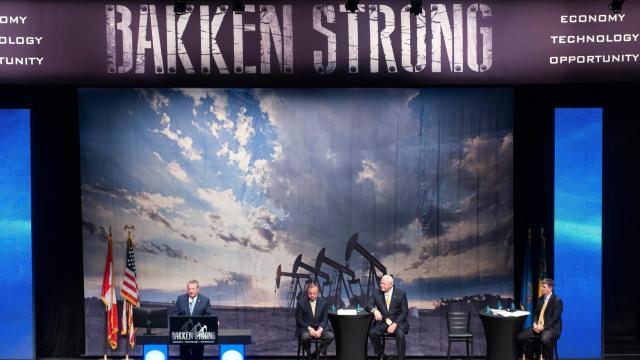CEO pay at some of the country’s top oil and gas companies last year stayed more than 100 times above the median salary of workers at that company, a new analysis has found. In some cases, that gap increased — even as those companies laid off workers and took in federal aid money.
The analysis, published Monday by BailoutWatch, a nonprofit watchdog group, examined the financial documents of several large publicly traded oil companies to glean the initial data. Those documents, known as proxy statements, filed with the Securities and Exchange Commission before a company’s shareholders meet annually contain all kinds of information on a corporation, including CEO salaries. BailoutWatch then compared these statements to past tax documents filed with the SEC that detail how many employees were laid off last year, as well as the total amount of bailout money companies received through special coronavirus-related federal tax breaks that the group calculated in a report issued last year.
The results are pretty striking. The analysis finds that at a dozen oil companies — including big names like Chevron, ConocoPhillips, and Phillips 66 — CEO pay in 2020 was more than 100 times that of the median worker’s pay. All of those companies laid people off last year, including the nine companies that collectively got $US4.8 ($6) billion in federal bailout money.
That bailout money from last year was the result of a panic around the fate of the industry, a president in the pocket of Big Oil, and loopholes in a tax law that let companies make out like bandits. As demand for fuel (and, correspondingly, oil prices) tanked at the beginning of the pandemic, oil and gas companies began to freak out about their prospects. The industry, Republicans, and President Trump’s administration began to frantically campaign for a fossil fuel-specific bailout, arguing that keeping the industry afloat was crucial to saving American jobs. While that didn’t happen, oil companies did ultimately benefit from changes to the tax code and bailout money tied to the CARES Act, the huge economic stimulus passed last year.
But pay gaps between CEO salaries and the median worker salary actually widened last year at six of the companies named in the analysis, the new analysis found. The gap increases ranged from a slight 7% increase at ConocoPhillips to a jaw-dropping 160% increase at Continental Resources. There, incoming CEO William Berry — who took over the job from Trump booster Harold Hamm — got a truly bonkers $US27 ($35) million in stock awards as a signing bonus when he joined the company in 2020, which accounts for a big chunk of that incredible 160% increase. Berry’s compensation — which also includes $US47,000 ($60,442) for personal use of the company plane and a $US176,000 ($226,336) relocation package (nice perk if you can get it) — was 260 times the median employee pay last year. The company also laid off 59 employees, or around 5% of its workforce, last year; the total cost of keeping them on based on median salary, BailoutWatch estimated, was $US6.6 ($8) million.
BailoutWatch didn’t find records of Continental benefiting from any federal bailout money. But nine companies in the analysis did get tax breaks while keeping that wild 100-times-or-more pay gap — and laying off hundreds of workers in the process. Baker Hughes, a Houston-based oilfield services giant, got $US117 ($150) million in federal tax benefits last year. Yet despite the influx of public money, the company laid off around 13,000 workers last year. It did, however, compensate its executives handsomely even as it let people go: The gap between its CEO’s compensation and the median worker salary widened by 25% in 2020. (Lorenzo Simonelli, the CEO in question, draws a $US15.3 ($20) million salary, which is now around 235 times that of the median worker’s pay.)
The oil and gas industry has long used its status as a job creator to cling to relevance, plastering their websites with photos of people in hard hats. But the new report shows that image is manufactured, and that these companies have used federal money and subsidies to pay CEOs lavish salaries. They may no longer be able to escape scrutiny either. The new chair of the House Natural Resources Subcommittee on Oversight and Investigations, Rep. Katie Porter, has invited the CEOs of Exxon, Devon Energy, and EOG Resources to testify at her first hearing on Wednesday to, in Porter’s words, “to explain why their corporations deserve billions in taxpayer-funded subsidies.” All three declined, but Porter vowed to keep “diving into how Big Oil is spending taxpayer dollars.” I’m very curious to see what else she finds.
